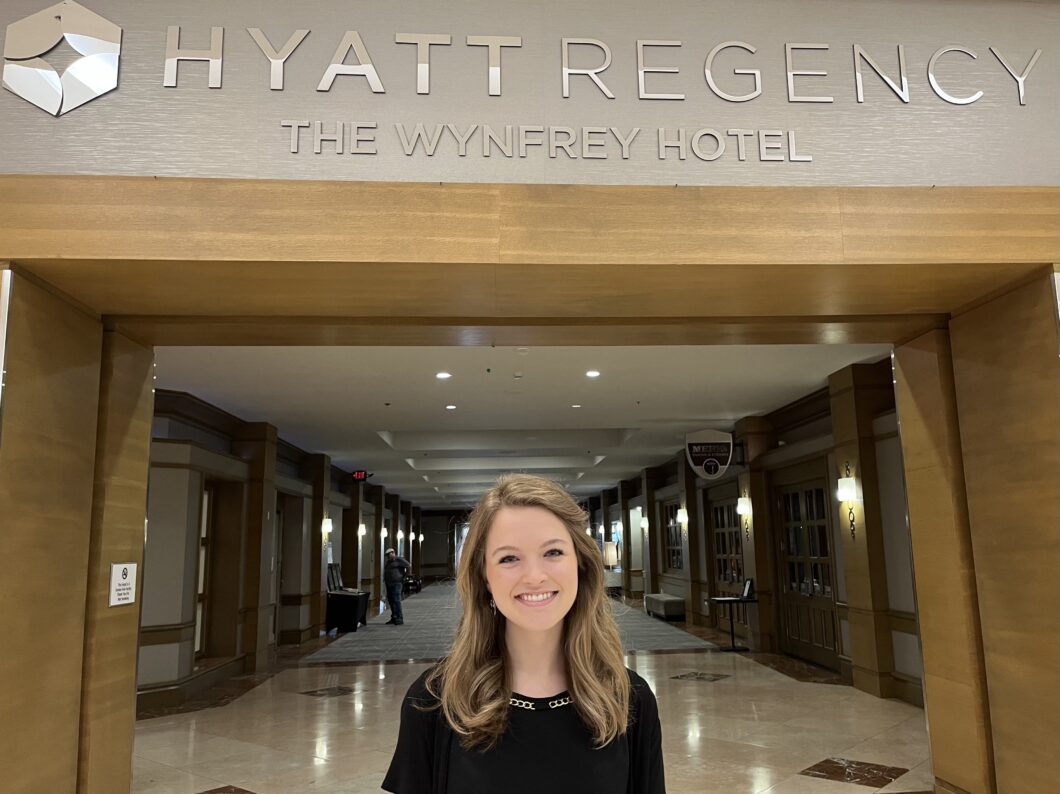In February, I attended the 2023 Speech and Hearing Association of Alabama (SHAA) Convention—my first time attending a convention in the fields of speech-language pathology and audiology. As an undergraduate student surrounded by professionals and graduate students, I expected to feel a bit out of place. My experience attending SHAA, however, showed me how the undergraduate years are actually the perfect time in one’s student career to attend a state convention.
Here are my top five reasons why undergraduates considering attending a state convention should go for it!
1. Your professors will understand. When I talked to my professors about missing class to attend SHAA, they encouraged me to take this opportunity and were gracious in excusing my absence. I was reminded that professors are excited to watch their students grow into professionals and want to assist us in our journeys to become SLPs or audiologists. Additionally, I realized that absence is more easily accepted and excused at the undergraduate level. Further along in our careers, missing a day or two of graduate school, clinical fellowship, or a job may mean missing an evaluation of a client, a non-negotiable deadline, or an important team meeting.
2. You’ll refine and expand your areas of interest. Attending a variety of sessions at a state convention is the perfect way to explore and re-examine your interests in the field—and you never know if you may just find a new niche! Even though I am on the path to become a speech-language pathologist (SLP), I went to a session about the intersection of audiology and speech pathology in the treatment of comorbid hearing loss and aphasia—and it was fascinating! Most students already have an idea of their areas of interest within speech-language pathology and audiology, but even with our classes, observations, or volunteer work, our knowledge of the field is still very limited. I would encourage fellow students: Don’t put yourself in a box too soon; it can limit us from exploring disorders, populations, and treatments with which we are less familiar.
3. You’ll have tons of opportunities to network. Don’t just attend sessions; talk to the presenters afterwards! After the sessions that I was particularly interested in, I spoke with the presenters, asking more questions about their research, their area of expertise, or their current projects. I learned that finding out a little bit more about the presenters and their work prior to the sessions gave me additional context and provided valuable information about any overlapping interests I had with the presenter that I could further discuss with them. A simple conversation about a common interest may lead to gaining a professional contact in the field—and, possibly, advice and opportunities for you in the future.
4. You’ll have unique access to student-only sessions. Prior to attending SHAA, I was not aware that many state conventions have sessions just for students. One thing to note is that these sessions are often geared toward graduate students—but that doesn’t make them any less beneficial for undergraduates! The session I attended was intended for graduate students preparing for their clinical fellowship, and I ended up being the only undergraduate at the session. Even though applying for clinical fellowships is still several years in the future for me, the session was extremely helpful to me as I envisioned preparing for graduate school applications. I learned insider tips about resumes, interviews, and cover letters for students in our field. Additionally, it is a great benefit to undergraduates to hear advice geared toward graduate students because we still have time to make changes, if necessary. For example, if after attending a student session, a second-year graduate student realizes that they are missing one specific type of experience on their resume, they may not have much time left in school to gain that experience—not the case, however, for us undergraduates!
5. You’ll get the chance to gauge your knowledge. Lastly, some state conventions, including SHAA, have a “Quest for the Cup” event, in which teams of graduate students representing their universities put their knowledge of the PRAXIS to the test. I loved being able to watch the graduate teams compete! As the PRAXIS-style questions were posed, I sat in the audience attempting to guess the answers before they were revealed. It was entertaining and very informative! I have never studied for the PRAXIS, so it was interesting for me to learn what material is deemed most important for future professionals to know. This allowed me to gauge my current knowledge of disorders, procedures, theories, treatments, and so forth. I was encouraged that my undergraduate studies at Auburn University have equipped me well for the future—and that I was able to guess more answers than I thought I would be able to. It reminded me that our speech, language, and hearing sciences undergraduate courses give us knowledge that we will still draw upon years later in graduate school—and for the rest of our careers!
Overall, my experience at SHAA showed me that it is never too early to immerse yourself in the field, and attending a state convention is the perfect way to do so. Although I may have been one of the youngest attendees, I felt right at home, surrounded by inspiring individuals who are passionately finding solutions and paving new paths in our field. We undergraduates have our whole careers in front of us, and state conventions are the perfect opportunity for us to learn and grow. My encouragement? Don’t wait until grad school to attend one!


After applying for tax registration, individuals and businesses receive a TIN certificate from the National Board of Revenue (NBR).